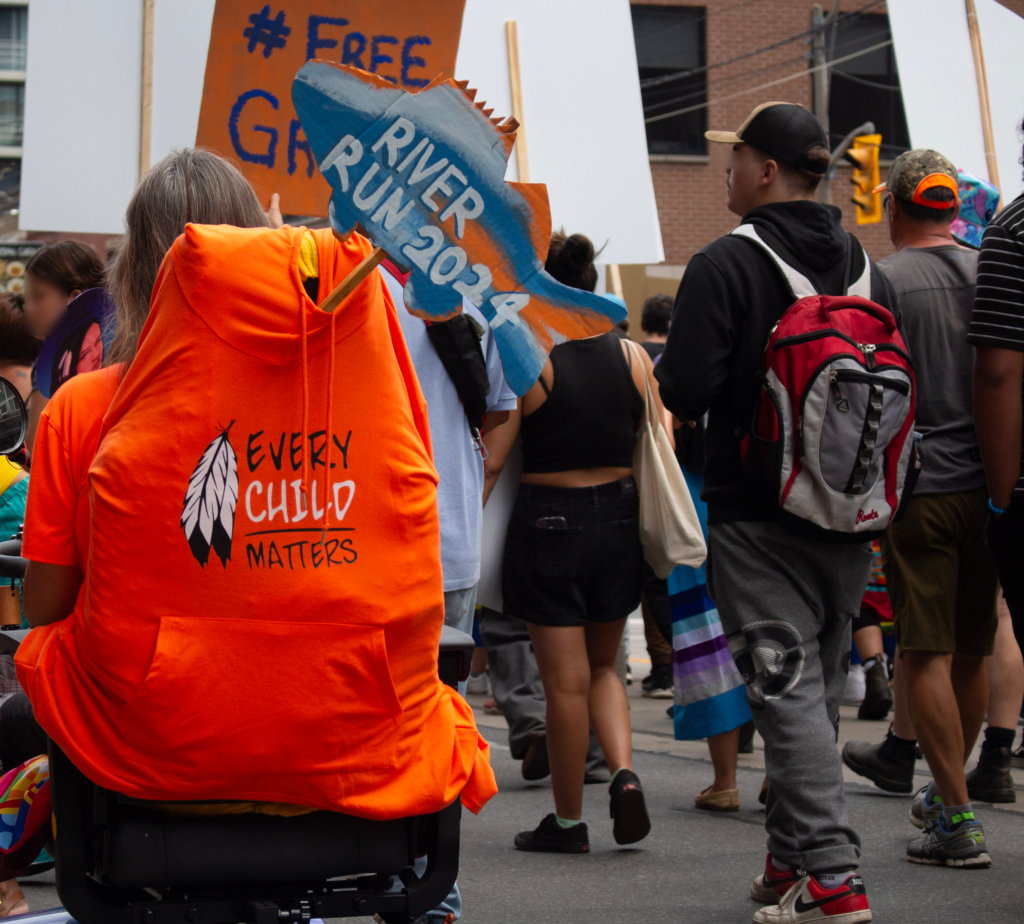
Listen to full story here:
The mercury that continues to poison the Grassy Narrows community was the focus of the protest on Sept. 18, 2024, when members of the Asubpeeschoseewagong First Nation (Grassy Narrows) and their allies marched towards Queen’s Park.
Between 1960 and 1972, the researchers of a 2023 study say over 9 tonnes of mercury were dumped into the English-Wabigoon river in Grassy Narrows, leading to several health and environmental issues. According to a 2014 University of Manitoba study, in humans, mercury poisoning causes various long-term symptoms, such as “loss of strength … tremors, loss of balance, and accelerated body deterioration, leading to impaired motor functioning.”
Despite the fact that the Wynne Liberal government committed over $85 million to cleanup the mercury spill in 2017, the plan to clean up the river has not made it out of the research phase. In a statement to CBC in 2018, the Environment Minister Glen Murray said that preparation work would be completed by the end of summer, 2018. Six years past that tentative guideline, the community is still reeling from the effects of mercury in their waterways and waiting for a solution.
“For myself, I do have mercury, I have symptoms. Sometimes I get shaky, and I can’t hold my stuff right,” said Lexx, one of the participating protesters.
High amounts of mercury have been found in fish local to the English-Wabigoon river, clocking in at 30-40 times the provincial guideline for acceptable mercury levels in food, according to a report by the Royal Commission on the Northern Environment..
“Our parents, they ate fresh [fish], and later we found out we have mercury in our water,” said Lexx.
Although ownership of the Dryden Mill has changed hands multiple times, pollution from the mill continues to this day, according to a study published in May of 2024. The researchers found that the mill is leaking sulfur compounds into the water, creating a by-product known as methylmercury. According to the same study, this contributes to the high levels of mercury found in freshwater fish in the area. Instead of naturally decreasing over time, the level of methylmercury in the water is being maintained by the Dryden mill, essentially prolonging the environmental crisis at hand.
The mercury spill has had more of an impact on the community than just health. A large part of the Grassy Narrows economy has slowed as a direct result of mercury poisoning, according to a study conducted by the Canadian Medical Association Journal. The Asubpeeschoseewagong have a long and storied history of fishing, both commercial and private; utilized both as a source of food and money.
The mill itself carries an economic impact as well. In an interview with NWO Newsweek, Dryden Mayor Jack Harrison said that “If [the mill] was closed down now, that would be a significant blow to our community.”
The mill serves as a large economic player in the region, processing logs into paper pulp. Dryden Pulp Mill accounted for 4 per cent of all wood pulp produced in Canada in 1970, according to a report conducted by the Royal Commission on the Northern Environment. Shutting down the mill would impact more than just the wood pulp industry, however. Logging is another major industry in Dryden, and a closure would mean an excess in supply for logging companies in the region.
Efforts of appeasement have been made by the Ontario government. In the 1970’s Ontario set up a Mercury disability board, tasked with paying out disability benefits to those affected by the contamination. Mentioned earlier, the Wynne government earmarked $85 million for the cleanup of Grassy Narrows in 2017. In 2018, the Ford Government pinned disability benefits for people affected by mercury poisoning to the annual rate of inflation.
As of October, 2024; however, the mill is still in operation. According to a 2016 article in the Huffington Post quoting Chief Simon Fobister Sr., up to 90 per cent of the Grassy Narrows community is affected by mercury poisoning, with no clear resolution in sight.
“We’re fighting for our elders, our youth,” said Lexx.
With files from Charlotte Cole / The Eyeopener
This article may have been created with the use of AI tools such as Google Docs, Grammarly, and/or Otter.ai for transcription.





